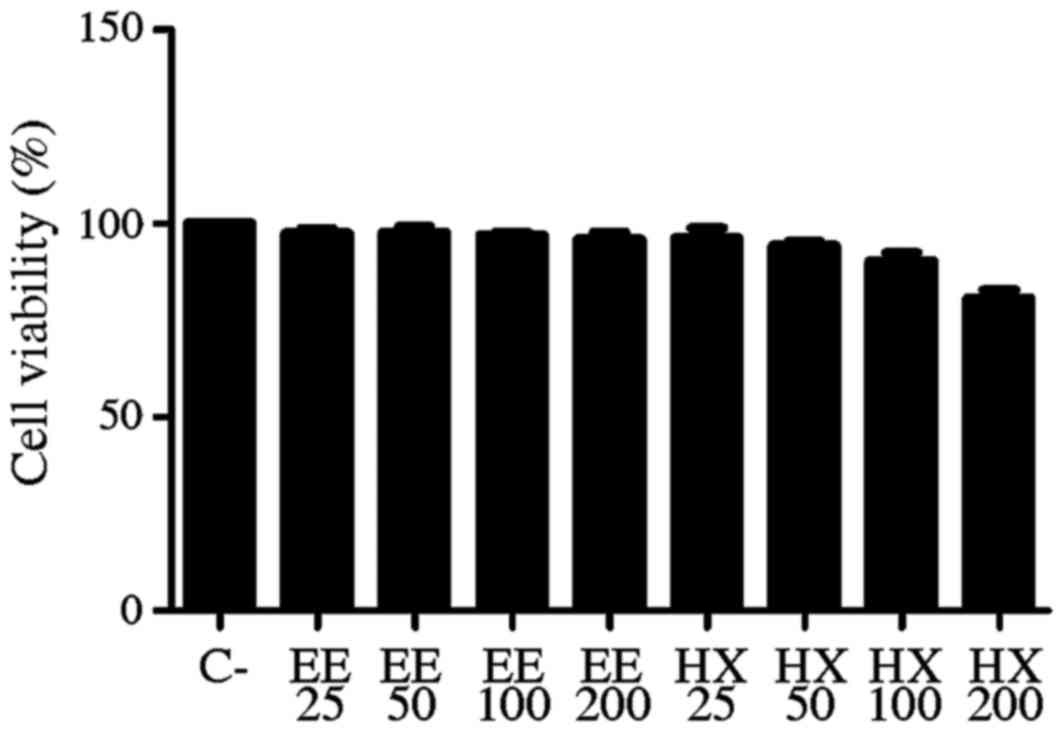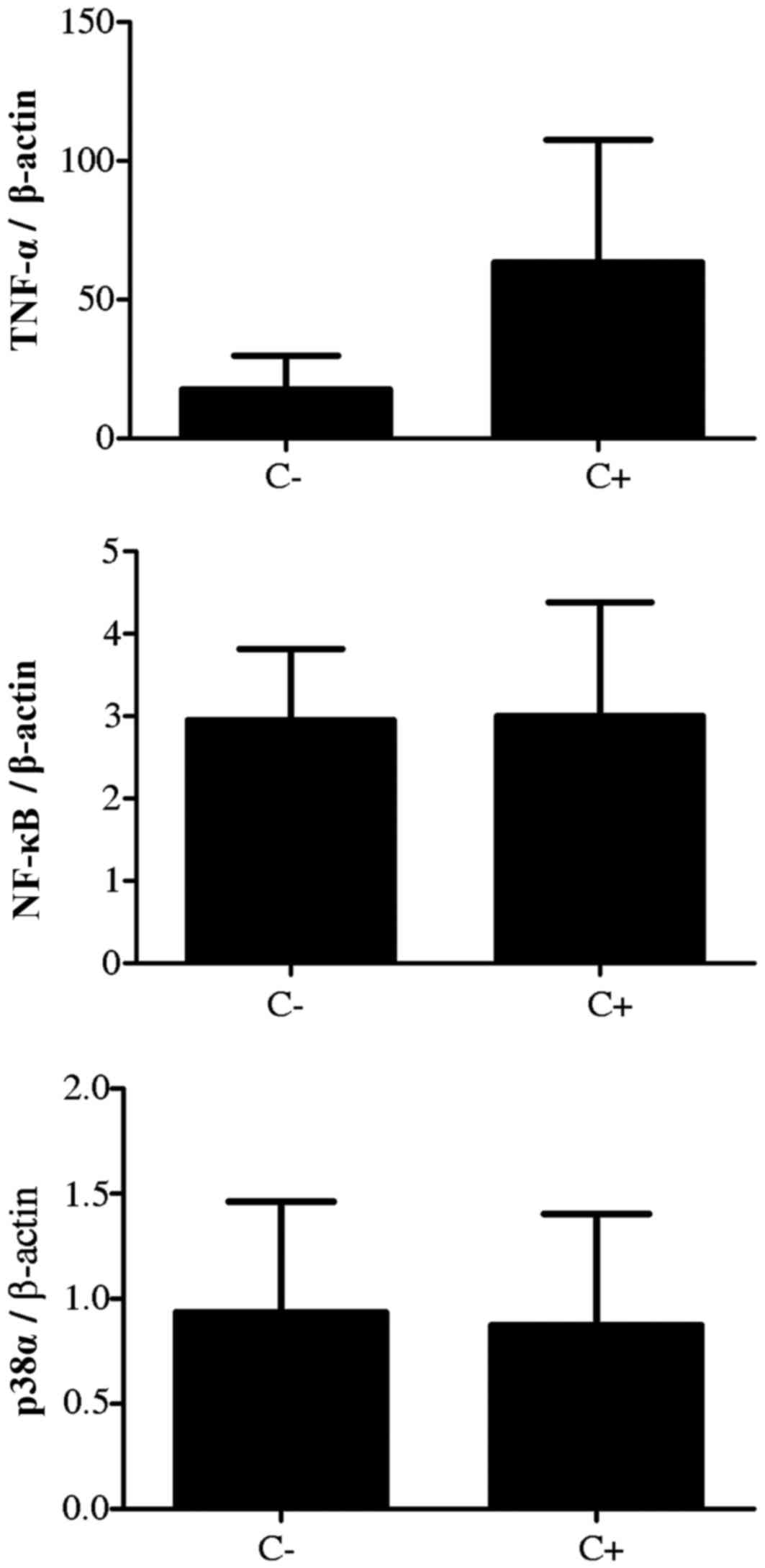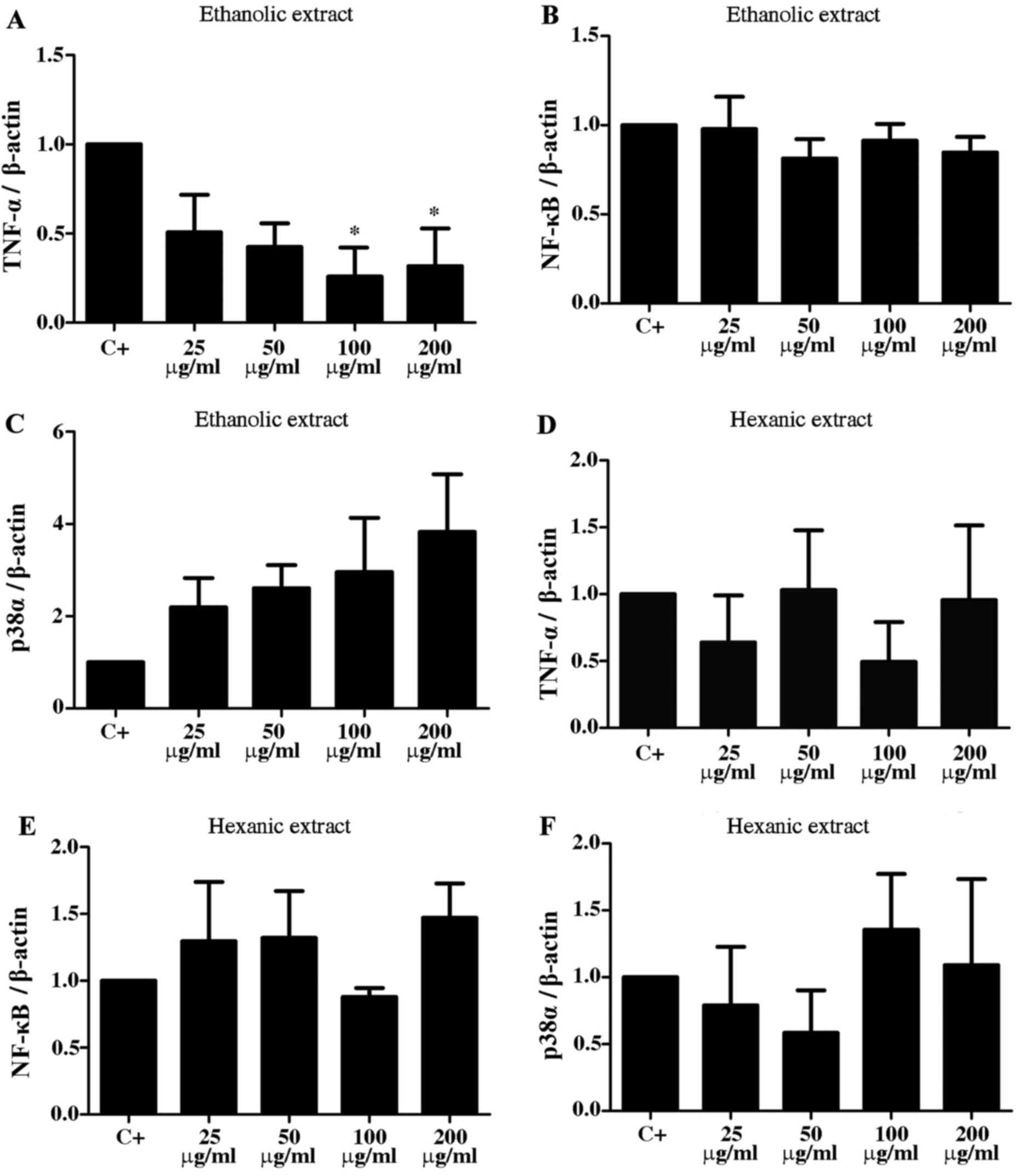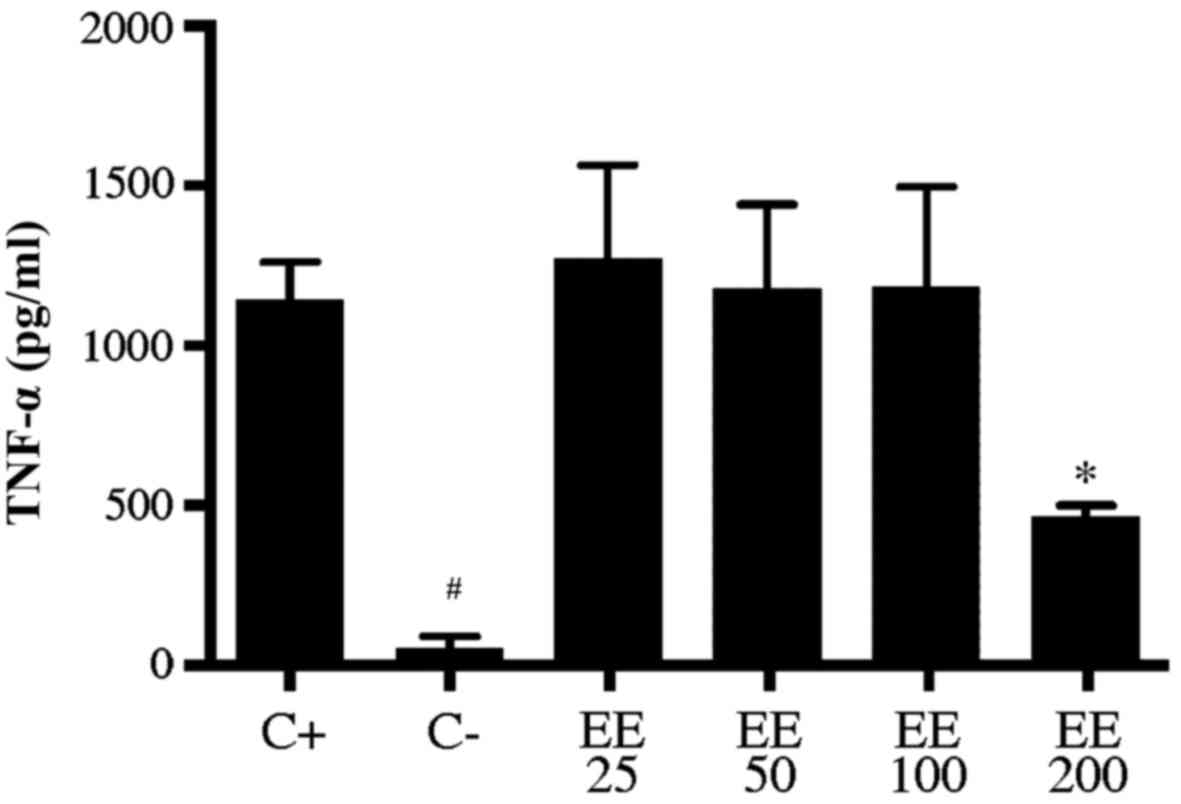|
1
|
Germano G, Allavena P and Mantovani A:
Cytokines as key component of cancer-related inflammation.
Cytokine. 43:374–379. 2008. View Article : Google Scholar : PubMed/NCBI
|
|
2
|
Bartlett DL, Ma G, Alexander HR, Libutti
SK and Fraker DL: Isolated limb reperfusion with tumor necrosis
factor and melphalan in patients with extremity melanoma after
failure of isolated limb perfusion with chemotherapeutics. Cancer.
80:2084–2090. 1997. View Article : Google Scholar : PubMed/NCBI
|
|
3
|
Madhusudan S, Muthuramalingam SR,
Braybrooke JP, Wilner S, Kaur K, Han C, Hoare S, Balkwill F and
Ganesan TS: Study of etanercept, a tumor necrosis factor-alpha
inhibitor, in recurrent ovarian cancer. J ClinOncol. 23:5950–5959.
2005. View Article : Google Scholar
|
|
4
|
Harrison ML, Obermueller E, Maisey NR,
Hoare S, Edmonds K, Li NF, Chao D, Hall K, Lee C, Timotheadou E, et
al: Tumor necrosis factor alpha as a new target for renal cell
carcinoma: Two sequential phase II trials of infliximab at standard
and high dose. J ClinOncol. 25:4542–4549. 2007. View Article : Google Scholar
|
|
5
|
Garg A and Aggarwal BB: Nuclear
transcription factor-kappaB as a target for cancer drug
development. Leukemia. 16:1053–1068. 2002. View Article : Google Scholar : PubMed/NCBI
|
|
6
|
Beg AA and Baltimore D: An essential role
for NF-kappaB in preventing TNF-alpha-induced cell death. Science.
274:782–784. 1996. View Article : Google Scholar : PubMed/NCBI
|
|
7
|
Stroh C, Held J, Samraj AK and
Schulze-Osthoff K: Specific inhibition of transcription factor
NF-kappaB through intracellular protein delivery of IkappaBalpha by
the Herpes virus protein VP22. Oncogene. 22:5367–5373. 2003.
View Article : Google Scholar : PubMed/NCBI
|
|
8
|
Dolado I and Nebreda AR: Regulation of
tumorigenesis by p38α MAP kinase. Topics Curr Genet. 20:99–128.
2008. View Article : Google Scholar
|
|
9
|
Brandão HN, David JP, Couto RD, Nascimento
JAP and David JM: Química e farmacologia de quimioterápicos
antineoplásicos derivados de plantas. Quím Nova. 33:1359–1369.
2010. View Article : Google Scholar
|
|
10
|
Aravindaram K and Yang NS:
Anti-inflammatory plant natural products for cancer therapy. Planta
Med. 76:1103–1117. 2010. View Article : Google Scholar : PubMed/NCBI
|
|
11
|
Bhanot A, Sharma R and Noolvi MN: Natural
sources as potential anti-cancer agents: A review. Int J Phytomed.
3:9–26. 2011.
|
|
12
|
Newman DJ, Cragg GM and Snader KM: The
influence of natural products upon drug discovery. Nat Prod Rep.
17:215–234. 2000. View
Article : Google Scholar : PubMed/NCBI
|
|
13
|
Newman DJ and Cragg GM: Natural products
as sources of new drugs over the 30 years from 1981 to 2010. J Nat
Prod. 75:311–335. 2012. View Article : Google Scholar : PubMed/NCBI
|
|
14
|
Souza-Moreira TM, Moreira RRD, Sacramento
LVS and Pietro RCLR: Histochemical, phytochemical and biological
screening of Pliniacauliflora (Mart.) Kausel (Myrtaceae) leaves.
RevBras Farmacogn. 20:48–53. 2010. View Article : Google Scholar
|
|
15
|
Zhang P, Zhang E, Xiao M, Chen C and Xu W:
Enhanced chemical and biological activities of a newly
biosynthesized eugenol glycoconjugate, eugenol α-D-glucopyranoside.
Appl Microbiol Biotechnol. 97:1043–1050. 2013. View Article : Google Scholar : PubMed/NCBI
|
|
16
|
Rizzo LY, Longato GB, Ruiz AL, Tinti SV,
Possenti A, Vendramini-Costa DB, Sartoratto A, Figueira GM, Silva
FL, Eberlin MN, et al: In vitro, in vivo and in silico analysis of
the anticancer and estrogen-like activity of guava leaf extracts.
Curr Med Chem. 21:2322–2330. 2014. View Article : Google Scholar : PubMed/NCBI
|
|
17
|
Sultana B, Anwar F, Mushtaq M, Aslam M and
Ijaz S: In vitro antimutagenic, antioxidant activities and total
phenolics of clove (Syzygiumaromaticum L.) seed extracts. Pak J
Pharm Sci. 27:893–899. 2014.PubMed/NCBI
|
|
18
|
Liu H, Schmitz JC, Wei J, Cao S, Beumer
JH, Strychor S, Cheng L, Liu M, Wang C, Wu N, et al: Clove extract
inhibits tumor growth and promotes cell cycle arrest and apoptosis.
Oncol Res. 21:247–259. 2014. View Article : Google Scholar : PubMed/NCBI
|
|
19
|
Ye CL, Liu Y and Wei DZ: Antioxidant and
anticancer activity of
3′-formyl-4′,6′-dihydroxy-2′-methoxy-5′-methylchalcone and
(2S)-8-formyl-5-hydroxy-7-methoxy-6-methylflavanone. J Pharm
Pharmacol. 59:553–559. 2007. View Article : Google Scholar : PubMed/NCBI
|
|
20
|
Aisha AF, Ismail Z, Abu-Salah KM, Siddiqui
JM, Ghafar G and Majid Abdul AM: Syzygium campanulatum korth
methanolic extract inhibits angiogenesis and tumor growth in nude
mice. BMC Complement Altern Med. 13:1682013. View Article : Google Scholar : PubMed/NCBI
|
|
21
|
Pascoal AC, Ehrenfried CA, Lopez BG, de
Araujo TM, Pascoal VD, Gilioli R, Ruiz AL, Carvalho JE, Stefanello
ME and Salvador MJ: Antiproliferative activity and induction of
apoptosis IN PC-3 cells by the chalcone cardamonin from
Campomanesia adamantium (Myrtaceae) in a bioactivity-guided study.
Molecules. 19:1843–1855. 2014. View Article : Google Scholar : PubMed/NCBI
|
|
22
|
Michel MCP, Guimarães AG, Paula CA,
Rezende SA, Sobral MEG and Guimarães DAS: Extracts from the leaves
of Campomanesia velutina inhibits production of LPS/INF-γ induced
inflammatory mediators in J774A.1 cells and exerts
anti-inflammatory and antinociceptive effects in vivo. Rev Bras
Farmacogn. 23:927–936. 2013. View Article : Google Scholar
|
|
23
|
Jeong D, Yang WS, Yang Y, Nam G, Kim JH,
Yoon DH, Noh HJ, Lee S, Kim TW, Sung GH and Cho JY: In vitro and in
vivo anti-inflammatory effect of Rhodomyrtus tomentosa methanol
extract. J Ethnopharmacol. 146:205–213. 2013. View Article : Google Scholar : PubMed/NCBI
|
|
24
|
Flores G, Dastmalchi K, Wu SB, Whalen K,
Dabo AJ, Reynertson KA, Foronjy RFD, Armiento JM and Kennelly EJ:
Phenolic-rich extract from the Costa Rican guava
(Psidiumfriedrichsthalianum) pulp with antioxidant and
anti-inflammatory activity. Potential for COPD therapy. Food Chem.
141:889–895. 2013. View Article : Google Scholar : PubMed/NCBI
|
|
25
|
Serafino A, Vallebona Sinibaldi P,
Andreola F, Zonfrillo M, Mercuri L, Federici M, Rasi G, Garaci E
and Pierimarchi P: Stimulatory effect of Eucalyptus essential oil
on innate cell-mediated immune response. BMC Immunol. 9:2008.
View Article : Google Scholar : PubMed/NCBI
|
|
26
|
Santos FA, Rao VSN and Silveira ER:
Anti-inflammatory and analgesic activities of the essential oil of
Psidium guianense. Fitoterapia. 68:65–68. 1997.
|
|
27
|
Sharma R, Kishore N, Hussein A and Lall N:
Antibacterial and anti-inflammatory effects of Syzygiumjambos L.
(Alston) and isolated compounds on acne vulgaris. BMC Complement
Altern Med. 13:2922013. View Article : Google Scholar : PubMed/NCBI
|
|
28
|
Gourdeau H, Leblond L, Hamelin B,
Desputeau C, Dong K, Kianicka I, Custeau D, Boudreau C, Geerts L,
Cai SX, et al: Antivascular and antitumor evaluation of
2-amino-4-(3-bromo-4,5-dimethoxy-phenyl)-3-cyano-4H-chromenes, a
novel series of anticancer agents. Mol Cancer Ther. 3:1375–1384.
2004.PubMed/NCBI
|
|
29
|
Chetan BS, Nimesh MS, Manish PP and Ranjan
GP: Microwave assisted synthesis of novel 4H-chromene derivatives
bearing phenoxypyrazole and their antimicrobial activity assess. J
Serb ChemSoc. 77:1165–1174. 2012. View Article : Google Scholar
|
|
30
|
Mladenović M, Mihailović M, Bogojević D,
Matić S, Nićiforović N, Mihailović V, Vuković N, Sukdolak S and
Solujić S: In vitro antioxidant of selected
4-Hydroxy-chromene-2-one derivatives-SAR, QSAR and DFT studies. Int
J MolSci. 12:2822–2841. 2011. View Article : Google Scholar
|
|
31
|
Cheng JF, Ishikawa A, Ono Y, Arrhenius T
and Nadzan A: Novel chromene derivatives as TNF-alpha inhibitors.
Bioorg Med Chem Lett. 13:3647–3650. 2003. View Article : Google Scholar : PubMed/NCBI
|
|
32
|
Thareja S, Verma A, Kalra A, Gosain S,
Rewatkar PV and Kokil GR: Novel chromeneimidazole derivatives as
antifungal compounds: Synthesis and in vitro evaluation. Acta Pol
Pharm. 67:423–427. 2010.PubMed/NCBI
|
|
33
|
Correa RGC, Silva ML, Maia JGS, Gottlieb
OR, Mourão JC, Marx MC, Morais AA, Moura LL and Magalhães MT: Acta
Amaz. 2:531972.
|
|
34
|
Silva ML, Luz AIR, Zoghbi MGB, Ramos LS
and Maia JGS: Essential oil variation in Calyptranthes spruceana.
Phytochem. 23:2515–2516. 1984. View Article : Google Scholar
|
|
35
|
Maia JGS, Zoghbi MGB and Andrade EHA:
Aromatic Plants in the Amazon and their Essential Oils. Emílio
Goeldi Paraense Museum (Adolpho Ducke Series): Belém.
2001.(Portuguese).
|
|
36
|
Nanthakumar NN, Fusunyan RD, Sanderson I
and Walker WA: Inflammation in the developing human intestine: A
possible pathophysiologic contribution to necrotizing
enterocolitis. Proc Natl Acad Sci USA. 97:6043–6048. 2000.
View Article : Google Scholar : PubMed/NCBI
|
|
37
|
Strober W: Trypan blue exclusion test of
cell viability. Curr Protoc Immunol. 2001. View Article : Google Scholar
|
|
38
|
Yang J, Yang Q, Yu S and Zhang X:
Evaluation and validation of suitable reference genes for reverse
transcription-quantitative polymerase chain reaction studies in
cholangiocarcinoma patients and cell lines. Oncol Lett.
11:2673–2681. 2016.PubMed/NCBI
|
|
39
|
Piana C, Wirth M, Gerbes S, Viernstein H,
Gabor F and Toegel S: Validation of reference genes for qPCR
studies on Caco-2 cell differentiation. Eur J Pharm Biopharm.
69:1187–1192. 2008. View Article : Google Scholar : PubMed/NCBI
|
|
40
|
Livak KJ and Schmittgen TD: Analysis of
relative gene expression data using real-time quantitative PCR and
the 2(−Delta Delta C(T)) method. Methods. 25:402–408. 2001.
View Article : Google Scholar : PubMed/NCBI
|
|
41
|
Rozen S and Skaletsky H: Primer3 on the
WWW for general users and for biologist programmers. Methods Mol
Biol. 132:365–386. 2000.PubMed/NCBI
|
|
42
|
Herath TD, Darveau RP, Seneviratne CJ,
Wang CY, Wang Y and Jin L: Tetra- and penta-acylated lipid A
structures of Porphyromonasgingivalis LPS differentially activate
TLR4-mediated NF-κB signal transduction cascade and
immuno-inflammatory response in human gingival fibroblasts. PLoS
One. 8:e584962013. View Article : Google Scholar : PubMed/NCBI
|
|
43
|
Ferreira LC, Grabe-guimarães A, de Paula
CA, Michel MC, Guimarães RG, Rezende SA, de Souza Filho JD and
Saúde-Guimarães DA: Anti-inflammatory and antinociceptive
activities of Campomanesia adamantium. J Ethnopharmacol. 9:100–108.
2013. View Article : Google Scholar
|
|
44
|
Li LJ, Yu LJ, Li YC, Liu MY and Wu ZZ: In
vitro anti-inflammatory and free radical scavenging activities of
flavans from Ilex centrochinensis. Zhongguo Zhong Yao Za Zhi.
40:1523–1528. 2015.(In Chinese). PubMed/NCBI
|
|
45
|
Perkins ND: Integrating cell-signalling
pathways with NF-kappaB and IKK function. Nat Rev Mol Cell Biol.
8:49–62. 2007. View Article : Google Scholar : PubMed/NCBI
|
|
46
|
Foo SY and Nolan GP: NF-kappaB to the
rescue: RELs, apoptosis and cellular transformation. Trends Genet.
15:229–235. 1999. View Article : Google Scholar : PubMed/NCBI
|
|
47
|
Clément JF, Meloche S and Servant MJ: The
IKK-related kinases: From innate immunity to oncogenesis. Cell Res.
18:889–899. 2008. View Article : Google Scholar : PubMed/NCBI
|
|
48
|
Vallabhapurapu S and Karin M: Regulation
and function of NF-kappaB transcription factors in the immune
system. Annu Rev Immunol. 27:693–733. 2009. View Article : Google Scholar : PubMed/NCBI
|
|
49
|
Pikarsky E, Porat RM, Stein I, Abramovitch
R, Amit S, Kasem S, Gutkovich-Pyest E, Urieli-Shoval S, Galun E and
Ben-Neriah Y: NF-kappaB functions as a tumour promoter in
inflammation-associated cancer. Nature. 23:461–466. 2004.
View Article : Google Scholar
|
|
50
|
Wolska A, Lech-Maranda E and Robak T:
Toll-like receptors and their role in hematologic malignancies.
CurrMol Med. 9:324–335. 2009.
|
|
51
|
Surh YJ: Cancer chemoprevention with
dietary phytochemicals. Nat Rev Cancer. 3:768–780. 2003. View Article : Google Scholar : PubMed/NCBI
|
|
52
|
Aggarwal BB and Shishodia S: Molecular
targets of dietary agents for prevention and therapy of cancer.
Biochem Pharmacol. 71:1397–1421. 2006. View Article : Google Scholar : PubMed/NCBI
|
|
53
|
Hu MC, Wang YP, Mikhail A, Qiu WR and Tan
TH: Murine p38-delta mitogen activated protein kinase, a
developmentally regulated protein kinase that is activated by
stress and proinflammatory cytokines. J BiolChem. 274:7095–7102.
1999.
|
|
54
|
Enslen H, Raingeaud J and Davis RJ:
Selective activation of p38 mitogen-activated protein (MAP) kinase
isoforms by the MAP kinase kinases MKK3 and MKK6. J BiolChem.
273:1741–1748. 1998.
|
|
55
|
Zarubin T and Han J: Activation and
signaling of the p38 MAP kinase pathway. Cell Res. 15:11–18. 2005.
View Article : Google Scholar : PubMed/NCBI
|
|
56
|
Porras A and Guerrero C: Role of p38α in
apoptosis: Implication in cancer development and therapy. Atlas
Genet Cytogenet Oncol Haematol. 15:316–326. 2011.
|
|
57
|
Campbell J, Ciesielski CJ, Hunt AE,
Horwood NJ, Beech JT, Hayes LA, Denys A, Feldmann M, Brennan FM and
Foxwell BM: A novel mechanism for TNF-α regulation by p38 MAPK:
Involvement of NF-kappaB with implications for therapy in
rheumatoid arthritis. J Immunol. 173:6928–6937. 2004. View Article : Google Scholar : PubMed/NCBI
|
|
58
|
Héron-Milhavet L and Leroith D:
Insulin-like growth factor I induces MDM2-dependent degradation of
p53 via the p38 MAPK pathway in response to DNA damage. J BiolChem.
3:15600–15606. 2002.
|
|
59
|
Okamoto S, Krainc D, Sherman K and Lipton
SA: Antiapoptotic role of the p38 mitogen-activated protein
kinase-myocyte enhancer factor 2 transcription factor pathway
during neuronal differentiation. Proc Natl AcadSci USA.
20:7561–7566. 2000. View Article : Google Scholar
|
|
60
|
Park JM, Greten FR, Li ZW and Karin M:
Macrophage apoptosis by anthrax lethal factor through p38 MAP
kinase inhibition. Science. 20:2048–2051. 2002. View Article : Google Scholar
|
|
61
|
Zhang X, Shan P, Alam J, Davis RJ, Flavell
RA and Lee PJ: Carbon monoxide modulates Fas/Fas ligand, caspases,
and Bcl-2 family proteins via the p38alpha mitogen-activated
protein kinase pathway during ischemia-reperfusion lung injury. J
BiolChem. 13:22061–22070. 2003.
|
|
62
|
Comes F, Matrone A, Lastella P, Nico B,
Susca FC, Bagnulo R, Ingravallo G, Modica S, Lo Sasso G, Moschetta
A, et al: A novel cell type-specific role of p38alpha in the
control of autophagy and cell death in colorectal cancer cells.
Cell Death Differ. 14:693–702. 2007. View Article : Google Scholar : PubMed/NCBI
|
|
63
|
Schewe DM and Aguirre-Ghiso JA:
ATF6alpha-Rheb-mTOR signaling promotes survival of dormant tumor
cells in vivo. Proc Natl Acad Sci USA. 29:10519–10524. 2008.
View Article : Google Scholar
|
|
64
|
Geran RI, Greenberg NH, McDonald MM,
Schumacher AM and Abott BJ: Protocols for screening chemical agents
and natural products against animal tumour and other biological
systems. Cancer Chemother Rep. 3:17–19. 1972.
|
|
65
|
Suffness M and Pezzuto JM: Assays related
to cancer drug discovery. In: Hostettmann K (ed), Methods in Plant
Biochemistry. Assays for Bioactivity. 6:71–133. 1990.
|
|
66
|
Mensor LL, Menezes FS, Leitão GG, Reis AS,
Santos TC, Coube CS and Leitão SG: Screening of Brazilian plant
extracts for antioxidant activity by the use of DPPH free radical
method. Phytother Res. 15:127–130. 2001. View Article : Google Scholar : PubMed/NCBI
|


















